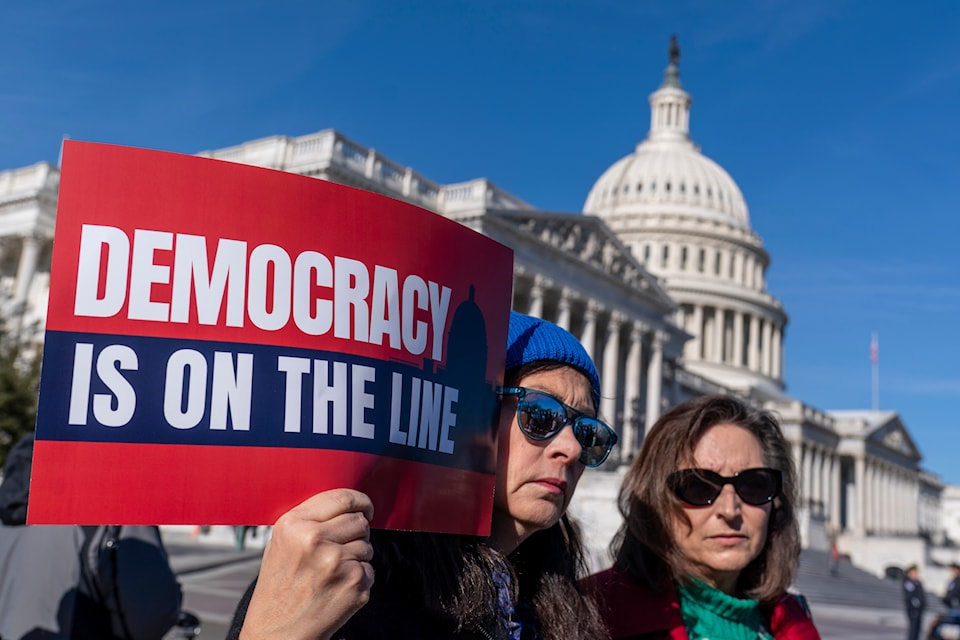This year's U.S. elections are taking place in a highly polarized social environment. This could allow different threats to jeopardize the democratic conduct of the polls and the outcome of the final vote itself.
A survey by The Chicago Council on Global Affairs published in September reported that 59 per cent of U.S. voters considered protecting democracy the major electoral stake in this election, with Democrats leading by 69 per cent and Republicans by 58 per cent.
Protecting democracy outweighed other topics including the economy, immigration and abortion rights.
Another survey by The Chicago Council in January found 81 per cent of Americans were more concerned about internal threats within their country than external ones, with 69 per cent considering weakening democracy and 61 per cent of political polarization as the major dangers, surpassing international terrorism, Russia’s military power and nuclear programs by Iran and North Korea.
A YouGov survey conducted in 2023 and 2024 of more than 5,000 Americans showed almost similar percentages for the Democratic and Republican parties when asked to share their opinion about each other.
Democrats have an unfavourable opinion of their opponents by 85 percentage points, an increase of 16 per cent since February 2023, while Republicans feel unfavourably toward the Democratic Party by 88 per cent, compared to 74 per cent last year.

American voters are called to the polls within this scenario, one that is exacerbated and politically exploited by Republican candidate Donald Trump, who has continuously sought to sow doubts about the legitimacy and fairness of elections.
This strategy is not new. It was adopted in 2016, and intensified in 2020 and there have been some hints of the former president using the same tactic this year.
Besides Trump’s unfounded claims, other threats on and after election day may play a fundamental role in increasing the unpredictability and volatility of the election. These threats include physical violence to voters, electoral workers and government targets, disruptions from election officials, and foreign interferences spreading disinformation.
Violence
A survey by the non-partisan Brennan Center for Justice between February and March 2024 found that 92 per cent of the 928 local election officials surveyed increased security for voters, workers and infrastructures for the current elections, including cybersecurity and physical security of election offices and polling places.
The survey also found that 38 per cent of local election officials experienced harassment, abuse and threats, an eight per cent increase from last year. Physical safety concerns have also increased to the same level as 2022 when the number reached 54 per cent from 45 per cent in 2023.
A report by the bi-partisan non-profit Center for Strategic and International Studies found there has been a sharp rise in terrorist attacks against government targets, largely driven by partisan political beliefs since 2016. From January 2016 to April 2024, there were 21 such incidents, a large increase compared to two in the previous two decades, largely fuelled by the spread of conspiracy theories.
The ideology of anti-government terrorists has also shifted. While from 1994 to 2004 most attacks were driven by a general opposition to federal authority, today they are motivated by partisan politics, with 49 per cent of such incidents from 2016 to 2023 driven by political beliefs, compared to just 29 per cent by opposition to federal authority.
The Department of Homeland Security (DHS) has identified right-wing extremist groups as the most significant threat to domestic security in the U.S. It describes the terrorism threat environment as “high” in the coming year due, among different factors, this year’s election.
Interference from election officials
Some U.S. counties have a history of potentially pushing back certification results, disqualifying ballots and generally disrupting normal election procedures, as happened during Trump’s plan to overturn the 2020 election.
Some of them include Cochise County in Arizona, a Republican area where officials refused to certify the midterm election results in 2022; Fulton County in Georgia, where a court rejected last month a lawsuit by a local commissioner claiming she had the right to refuse to certify the results and where a judge blocked a rule requiring the hand-count of ballots for the entire state; and Nye County in Nevada, with civil rights groups denouncing the county for hand-counting ballots instead of the more reliable voting machines.
The democracy watchdog CREW identified 35 election officials across the U.S. who have already refused to certify results and may be in the position to do it again in states including Arizona, Colorado, Pennsylvania, New Mexico, Nevada, Georgia, North Carolina and Michigan.
CREW reported states’ certification deadlines may be deeply affected by the obstruction of normal electoral proceedings. Legal remedies in place to protect voters are criminal charges, procedures to remove officials from their positions, and court orders to comply with the law.
Foreign interference
In a close race like this year’s, even swaying little pockets of voters can be crucial. That’s why disinformation spread by foreign actors like Russia, China and Iran has been closely watched.
The Soufan Center, an independent non-profit research organization, reported tactics from these countries have increased in sophistication, such as deploying AI content and financially supporting pro-Russian U.S. media.
The Office of the Director of National Intelligence announced in a press release last Friday that Russian influencers created a video depicting some individuals as Haitian immigrants illegally voting in Georgia. The office also expects Russia to spread more material weeks and months after the election.
Despite different strategic goals, the three countries are aligned in their efforts to polarize further the American public and sow doubts about electoral procedures.


.png;w=120;h=80;mode=crop)
